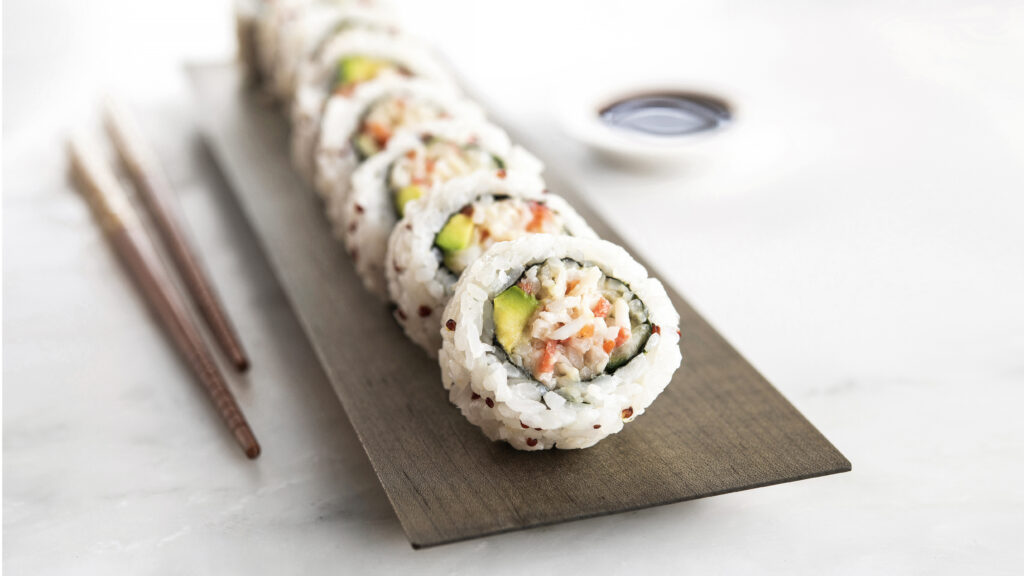4 Mins Read
The Canadian government has pumped C$5M in funding for plant-based seafood startup Konscious Foods, amid rising threats to British Columbia’s salmon trade.
Konscious Foods, the vegan seafood startup founded by Yves Potvin (of Gardein fame), has received a C$5M ($3.5M) injection from the Canadian government.
The funding was announced by Rechie Valdez, the federal small business minister, via PacifiCan, the economic development agency dedicated to British Columbia. “Just like so many communities across Canada, Richmond is home to entrepreneurs who are developing the creative, sustainable products that the world demands,” she said.
“PacifiCan’s support means that businesses such as Konscious Foods can continue to grow locally, creating quality jobs here at home, feeding our communities, and competing on the global stage.”
It comes at a time when the province’s famous salmon industry is under pressure, with disease outbreaks wrecking the fish population in Canada’s largest wild salmon migration route. Last summer, the national government banned open-net farming to protect the species, though the law wouldn’t come into effect until almost the end of the decade.
Konscious Foods looks to expand jobs and go global

Based in Richmond, British Columbia, Konscious Foods was set up in 2021 by Potvin, 18 years after he founded plant-based meat leader Gardein. The company makes frozen vegan sushi, onigiri and poke bowls, using seafood analogues like plant-based tuna, salmon and snow crab.
They’re available in the freezers at 4,500 supermarkets in Canada and the US, including Whole Foods Market, Sprouts Farmers Market, Target, and Albertsons-Safeway, among others. The products are adaptable to foodservice formats, including catering, micro-markets, vending, in-flight service, sushi bars and quick-service restaurants.
The startup, which raised C$26M in a seed funding round in 2023, uses several ingredients grown and processed in Canada – including quinoa, tomatoes and carrots – with a focus on non-GMO and organic certifications where possible.
With this financial support from the government, it will now look to scale up manufacturing and bring its products to global markets, in addition to creating new jobs.
The funding was provided through PacifiCan’s Business Scale-up and Productivity programme, which makes strategic investments in key economic sectors to help companies accelerate their growth and expansion.
As an agency, PacifiCan works with companies that are building innovative businesses, creating quality jobs, and supporting inclusive growth in British Columbia.
“As an innovative startup, we disrupted the sushi world with the first great-tasting plant-based frozen sushi,” said Konscious Foods Canada president and COO Michael Watt. This investment has allowed us to grow quickly, win on a global stage and accelerate the next wave of innovation, including plant-based Smoked Salm’n, Sno’Crab Cakes and Shr’mp.”
Public funding and plant proteins key to Canada’s food tech sector

From the government’s perspective, the investment in Konscious Foods will help create more than 40 jobs in British Columbia, generate demand for its Canadian suppliers while growing exports, and subsequently boost the local economy.
It’s also aimed at building prosperity for British Columbians, who have been directly impacted by the decline in Pacific salmon populations due to climate change and disease outbreaks. The BC Salmon Farmers Association last year suggested that the ban on open-net farming could cost up to 6,000 jobs, hindering an industry that generates C$1.2B ($880M) for the province.
First Nations and coastal populations rely on open net-pen aquaculture for their livelihoods, but the government released a draft transition plan to support these communities and identify opportunities in “clean aquaculture technology” months later.
And there was a recognition that this move to restrict open-net farming was crucial. “This date will serve the longer-term needs of protecting wild Pacific salmon from the impacts of the open-net pen fish farm industry, and is a positive step in that regard,” said Bob Chamberlin, chairman of the First Nation Wild Salmon Alliance.
This is not the first time the federal government has invested in an alternative seafood project. In November 2023, it contributed C$4.5M to a C$11.4M project involving vegan seafood maker New School Foods, precision fermentation startup Liven Proteins, and dehydration solutions provider NuWave Research to develop a whole-cut vegan wild salmon analogue.

This effort was led by Protein Industries Canada, a public-private partnership for alternative proteins and one of the country’s economic clusters. It has invested more than $105M into projects that promote sustainable protein production and innovation, encouraging collaboration across the value chain.
In fact, unlike the US or the UK, public funding represents a much larger chunk of food tech funding in Canada (30%), and analysis shows that plant-based food accounts for 12% of all investments in the category, making it “central to the country’s broader food tech ecosystem”. The government’s faith in Konscious Foods is further proof of that.



